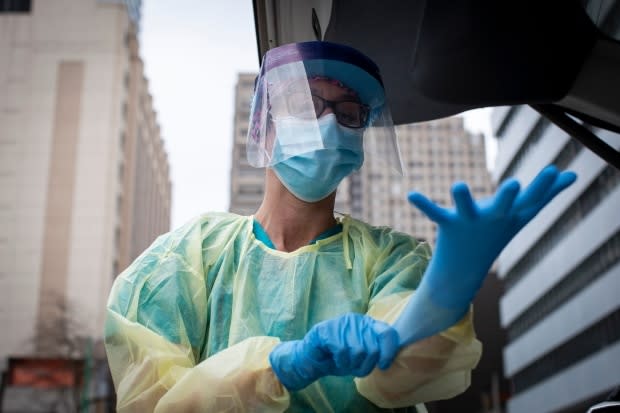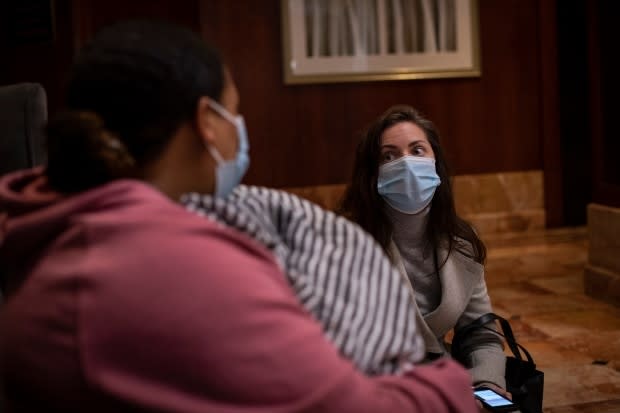Homeless, pregnant, COVID-positive — and bearing the brunt of a pandemic
Inside a labour and delivery room at Toronto's Michael Garron Hospital, Diamond is in her bed, steeling herself for the birth of her first child.
Outside the door, a sign warns hospital staff to take "droplet precautions" before entering.
Diamond's midwife Jenna Bly is by her side, dressed head-to-toe in protective equipment — a gown layered over her scrubs and tucked into her gloves, with her face mask leaving only her eyes visible to her frightened client.
On this day in April, Diamond is nine months pregnant. Homeless. A victim of domestic abuse. And, as of less than a day earlier, officially COVID-positive.
Diamond wonders if she's dying.
Bly worries what will happen if she does.
The midwife broaches a grim subject: how to prepare a living will for her client, who's just in her 30s, and whose only symptom — so far — has been a bit of a cough.
"I didn't want this baby to just go into the foster system without any plan. I wanted to know what she wanted for the baby," Bly later recalls. "So we spent the few hours before the baby was born coordinating with various supports, to create an emergency plan if she were to go on a ventilator."
She pauses. "It's not something I usually do at a birth."
But these are not typical times. Diamond, whose identity CBC News is concealing to protect her safety, is among the most vulnerable members of society — a new immigrant who fled her Toronto home after a violent assault, forcing her into the city's shelter system with no clear path to stable housing.
Researchers and advocates alike believe she's just one example of the kind of person COVID-19 strikes the hardest. In a city like Toronto, there are more of these people than you'd think.
"Unfortunately, her story is shockingly not uncommon," says Kaitlin Schwan, senior researcher at the Canadian Observatory on Homelessness.
"For folks on the front lines, you're really just trying to scrape together resources to support someone in this situation."
Pandemic 'sheds light on inequalities'
It's been close to four months since Toronto's first suspected case of COVID-19.
Since then, roughly 24,000 people have been confirmed infected across the province, with more than 2,000 Ontarians dying to date.
Research from ICES, a not-for-profit research institute, suggests many of those positive cases have come from marginalized communities — neighbourhoods where poverty and housing instability intersect.
"This pandemic sheds light on inequalities we have already," says Dr. Astrid Guppmann, chief science officer at ICES and a physician at SickKids hospital.
Compared with Ontarians not tested for COVID-19, those tested — and those confirmed positive — were more likely to live in neighbourhoods with greater residential instability, material deprivation and dependency, and lower income status, the research found.
Those confirmed positive also were more likely to live in communities with a relatively greater concentration of immigrants and visible minorities.
The findings are still preliminary, but so far the results aren't surprising, Guppmann adds.
That's because researchers have long known poverty and marginalization put people at a greater risk of poor health, which can be tied to any combination of factors from high stress levels, to food insecurity, to crowded — or nonexistent — housing.
"What COVID has done is just made this unignorable," says Dr. Andrew Boozary, an assistant professor at the University of Toronto's Dalla Lana School of Public Health.
"But we've ignored it and been willfully blind to these outcomes for decades."
Waiting for test results, pregnant and alone
It's now May, and Diamond is sitting in the lobby of a downtown hotel, holding her weeks-old baby girl.
The newborn is wrapped up in a white blanket with little pink polka dots with her face covered by a black-and-white striped towel. Her mother speaks slowly, her quiet voice muffled by her blue surgical mask.
"I'm in Canada by myself. I don't have family here," she says.
Diamond moved here from Ethiopia five years ago. Earlier this year, she first entered a Toronto women's shelter after fleeing domestic abuse, and while she's not sure if that's where she caught the disease during the third trimester of her pregnancy, it's a possibility.
"In the shelter, I lived in one room with three people," she explains. "Sharing the washroom — everything."

That's where she first met Bly, who has spent the last year-and-a-half working with precariously-housed clients as the creator and team lead for South Riverdale Community Health Centre's MATCH midwives program.
After Diamond tested positive for COVID-19, the hours leading up to her delivery in mid-April were full of fear and uncertainty for both women.
For Bly, who is married with three little girls of her own, it marked her first time helping deliver a baby for a COVID-positive mother. While getting ready to head to the hospital, she wondered if she was putting her own family at risk. Once she got to the site, she threw up.
"There's this deadly virus ravaging the world, and I had to be in the room with it," Bly says. "Then I got in the room, with this person that I knew, and I was just providing care."
Thankfully, after delivering a healthy baby, her client didn't need to use the end-of-life directives in her living will — her symptoms never worsened beyond a cough.
But who was going to care for her now, this new mother with a contagious disease?
At the urging of Bly and the midwife team, Diamond and her newborn were later admitted to Toronto's so-called "COVID Hotel."
There, on a site near an industrial area of the city — the exact location is being kept secret from the general public — residents experiencing both homelessness and COVID-19 are able to recover under the city's watch.
'The only lasting solution is housing'
The 200-bed recovery facility opened in April in partnership with the University Health Network, Inner City Health Associates and other community health providers, and provides medical support and meals to clients and even toys, which are cleaned in between uses, for their children.
So far, more than 210 people like Diamond have come and gone, with close to 80 clients currently staying at the site.
Mary-Anne Bédard, general manager of Toronto's Shelter, Support and Housing Administration, says a second site opened on May 16 in a downtown location, which is providing a space for people awaiting test results and close contacts of confirmed or suspected cases.
Bédard says these sites are opening at "record speed."
Others say the city lagged behind in its efforts, leaving too many homeless residents stuck in the close quarters of Toronto's jam-packed shelter system as the city's case count kept rising.
"It certainly was a catalyst for spread," says Rafi Aaron, a spokesperson for the Toronto-based Interfaith Coalition to Fight Homelessness. "Because, at the best of times, the conditions people were in were breeding grounds for COVID-19."
Crowded shelters, like other congregate settings, have proved to be a flash point for transmission. As of May 20, Toronto has experienced 352 COVID-19 cases tied to outbreaks in the shelter system.

"The primary policy intervention has been 'stay at home,' but that's not something we can do amid housing precarity," stresses Schwan, who is also co-chair for the recently-launched Women's National Housing and Homelessness Network.
"We finally understand the centrality of housing to well-being — to health care — because of COVID."
Boozary, the assistant professor at U of T, calls housing "the only lasting solution."
With COVID-19 further exposing the health disparities and vulnerabilities of marginalized residents, he says all levels of government need to build strategies to house all Canadians. And sooner, not later, amid growing fears the cases among the country's poor and homeless could keep rising, with a ripple effect long after the pandemic ends.
"Being able to provide people with decent comfortable housing has health-care benefits, cost benefits, economic benefits," Boozary says.
"And most importantly, there's human dignity."
Slipping through the cracks
For Diamond, the COVID-19 crisis is just another hurdle she didn't need.
After recovering from her illness at the "COVID Hotel," she was sent to her current living quarters in another city-operated hotel room, kilometres away, with her baby. She's not sure where she'll go next.
Bly, who is still checking on Diamond with the MATCH midwives team, is trying to connect her to housing providers, hoping to find her a permanent roof over her head.
But with years-long wait lists for social housing, the future looks bleak. Bly worries her client, and others like her, will simply slip through the cracks.

While speaking to CBC News in the hotel lobby, Diamond starts crying, her soft voice cracking.
"I've struggled too much in my life, by myself, shelter to shelter," she says. "No one can understand what happened in your life. Sometimes I'm sad. Angry. Shouting, because so many things are happening in my life…"
She trails off, still holding her newborn.
"So many hopes I have," she says.
"I need for my baby a house — to live by myself, and take care of my baby."


